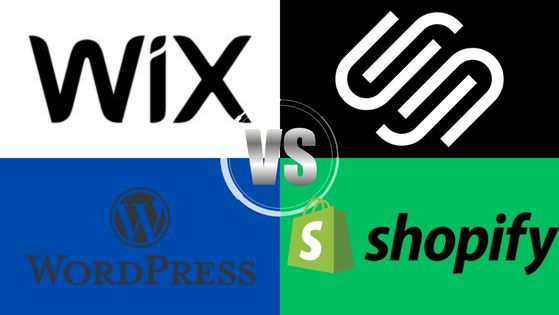In the world of website builders and content management systems, there are several popular options to choose from. The four most prominent platforms are Wix, Squarespace, WordPress, and Shopify. Each of these platforms has its own unique features and capabilities that cater to different website needs. In this article, we will compare wix vs squarespace vs wordpress vs shopify based on their features, pricing, ease of use, and customization options.

Wix
Wix is a cloud-based website builder that offers a wide range of features for creating websites. Wix is known for its drag-and-drop interface, which allows users to easily design and customize their websites without any coding skills. Wix offers more than 500 templates and a vast selection of design elements, including images, videos, and animations. Wix is suitable for businesses of all sizes, from small startups to large corporations.
Features:
- Drag-and-drop interface
- More than 500 templates
- Built-in SEO tools
- Mobile optimization
- Online store
- App market
- Social media integration
- Email marketing
Pricing: Wix offers a free plan, which includes Wix branding and limited features. Wix’s premium plans range from $14 to $49 per month, with each plan offering different features and levels of support.
Ease of use: Wix is easy to use, thanks to its drag-and-drop interface and intuitive design. Wix offers step-by-step tutorials and a knowledge base to help users get started.
Customization: Wix offers a wide range of customization options, including templates, design elements, and an app market that allows users to add third-party apps to their websites.
Squarespace
Squarespace is a website builder that offers a range of templates and design tools to create professional-looking websites. Squarespace is known for its clean and minimalist design, which makes it ideal for businesses that want a modern and sophisticated look. Squarespace offers a range of features, including built-in SEO tools, mobile optimization, and an online store.
Features:
- Templates
- Drag-and-drop interface
- Built-in SEO tools
- Mobile optimization
- Online store
- Social media integration
- Analytics
- Blogging platform
Pricing: Squarespace offers a free trial, but its premium plans range from $12 to $40 per month, with each plan offering different features and levels of support.
Ease of use: Squarespace is easy to use, thanks to its drag-and-drop interface and intuitive design. Squarespace offers step-by-step tutorials and a knowledge base to help users get started.
Customization: Squarespace offers a range of customization options, including templates, design elements, and an app market that allows users to add third-party apps to their websites.
WordPress
WordPress is an open-source content management system that powers more than 40% of all websites on the internet. WordPress is known for its flexibility and scalability, which makes it ideal for businesses of all sizes. WordPress offers a range of features, including themes, plugins, and an online store.
Features:
- Themes
- Plugins
- Customization options
- Mobile optimization
- Built-in SEO tools
- E-commerce integration
- Analytics
- Blogging platform
Pricing: WordPress is free to use, but users need to purchase a domain name and web hosting. Premium themes and plugins can also be purchased for additional features.
Ease of use: WordPress can be complex for beginners, as it requires some technical knowledge to install and configure. However, once installed, WordPress is easy to use, thanks to its intuitive interface.
Customization: WordPress offers a wide range of customization options, including themes, plugins, and custom code. WordPress also has a large community of developers who create third-party plugins.
Shopify
Shopify is an e-commerce platform that allows businesses to create and manage online stores. Shopify is known for its user-friendly interface and robust features, which make it ideal for businesses that want to sell products online. Shopify offers a range of features, including templates, payment processing, and shipping management.
Features:
- Templates
- Payment processing
- Shipping management
- Mobile optimization
- Analytics
- App store
- Social media integration
- Customization options
Pricing: Shopify’s premium plans range from $29 to $299 per month, with each plan offering different features and levels of support.
Ease of use: Shopify is easy to use, thanks to its intuitive interface and step-by-step tutorials. Shopify also offers 24/7 support to help users with any questions or issues.
Customization: Shopify offers a range of customization options, including templates, design elements, and an app store that allows users to add third-party apps to their online stores.
Comparison
When it comes to choosing between Wix, Squarespace, WordPress, and Shopify, there are several factors to consider, including features, pricing, ease of use, and customization options.
Features: All four platforms offer a range of features, including templates, mobile optimization, and analytics. However, Shopify is the only platform that focuses exclusively on e-commerce, while WordPress offers the most flexibility and scalability.
Pricing: Wix and Squarespace offer monthly plans that range from $12 to $49 per month, while WordPress and Shopify require users to purchase web hosting and domain names. Shopify is the most expensive platform, with plans ranging from $29 to $299 per month.
Ease of use: Wix, Squarespace, and Shopify are all easy to use, thanks to their intuitive interfaces and step-by-step tutorials. WordPress can be more complex for beginners, as it requires some technical knowledge to install and configure.
Customization: All four platforms offer customization options, including templates, design elements, and third-party apps. However, WordPress offers the most customization options, thanks to its open-source nature and large community of developers.
Conclusion
Choosing the right platform for your website or online store depends on your specific needs and budget. Wix and Squarespace are ideal for businesses that want an easy-to-use website builder, while Shopify is ideal for businesses that want to sell products online. WordPress is ideal for businesses that want flexibility and scalability. Ultimately, it’s important to consider all factors, including features, pricing, ease of use, and customization options, before making a decision.
